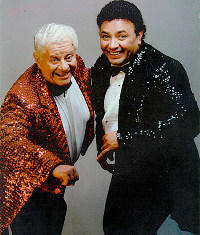It continues to fascinate me more and more how through each unit we continue to go through in this class, I'm both inspired and disappointed in society and it's relationship with Latin music as the years progressed through the 1900's. It was quite interesting learning about the different influences the legitimacy Latin dancing had, especially in the 70's through the early 90's
Mambo, Salsa and the Birth of Hustle
Prior to the late 1970's, there really wasn't such a thing known as "salsa dancing". Rather, the dancing and movements that were paired with Latin music was an expression of the music in it of itself. The dancing was salsa, not some form of dance performed during "salsa music". The dancing, the mambo, the salsa could not be separated from the music.
Beginning in the 70's, the consistent juxtaposition between Latin music as well as disco music that was being played in NYC clubs lead to the birth of "Latin Hustle". The term "Latin" however slowly disappeared from the term as many white Americans did not feel comfortable embracing a dance inspired by the Latin community. Driven by prejudice and ignorance, journalists during this time also were rarely willing to give credit to the Latin community for Hustle. They tried to create some sense of mystery with the dance.
This shows how Latin Americans were not being given the credit they deserved and henceforth, their dance and influence on culture was minimized and discriminated against. In fact, it wasn't just the Puerto Ricans and greater Latin community that was being thrown under the bus, but also the influence that the African American and Gay communities had on the Hustle. Many prominent and influential dancers note learning the Hustle from Gay clubs in the 70's.
While not surprising considering where the majority of American culture stood during the 1970's and their view on marginalized communities, the origin and initial influence of The Hustle had not been credited to the rightful people. Hustle indeed cam from the intersection of the Latino, African American and Gay communities.
Eddie Torres & His influence on the Legitimization of Latin Dance
Born in Harlem in the 50's, Eddie Torres would become a renowned dancer. He would soon become the biggest name in salsa. Although he was known for his salsa dancing, Jimmy Anton, one of Torres' students noted that he believes Eddie received a ton of influence from Latin Hustle in his dancing.
While Eddie was a terrific Salsa dancer, he had larger goals in mind. He was set on giving Salsa and Latin dance the legitimacy it deserved across the nation. He would quickly become the main reason Latin Dancing would become commercialized.
In 1980, Torres would finally get the opportunity to perform with a legend, Tito Puente. While performing with Puente, Eddie Torres would continue to teach Salsa dancing on the side until the year 1987. Finally, Puente gave Torres the "OK" to perform with fifty other dancers on Harlerm's stage, "The Apollo" (Tito Puente, left and Eddie Torres, right)
(Tito Puente, left and Eddie Torres, right)
Torres' performance at "The Apollo marked the beginning of the legitimacy of Latin Dance throughout NYC. The "Mambo Society" reached out to Eddie and together the began disseminating Torres' teachings on Salsa and Latin Dance throughout NYC. Latin Dance was finally being recognized for what it was.
As many students began going to these dance studios to learn Salsa, the Mambo Society considered charging more and focusing on profits rather than community building. Paula Cornier was a member of Mambo Society and was key in keeping it's vision on the community. She quotes "It's our culture. How do you sell our culture?". This quote sums up the spirit of Latin dance for me at least, and how it represents a community.
Comments
Post a Comment